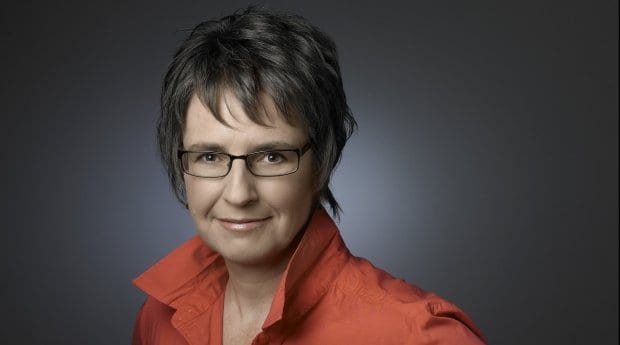There is little idyllic about the rural Alberta farmstead where Lynette Loeppky lived with her partner Cecile Kaysoe. The farm was hard to work, with predatory wildlife threatening livestock and pets, bone-chilling winters and poorly insulated walls.
The narrative might have been less grim had the relationship been affectionate, but this was the grimmest part of all.
“The constant irritation in her voice — the growing certainty that nothing I did would ever be right — wore away at my confidence, my sense of capability. Her presence, or even her pending presence, could send me into a state of watchful apprehension,” Loeppky writes in a confessional, intimate and page-turning memoir of the last days of the relationship.
Kaysoe employed the silent treatment interposed with criticism, cruel barbs and insensitivity, Loeppky alleges in Cease: A Memoir of Love, Loss and Desire, now nominated for a Lambda Literary Award. Throw in some internalized homophobia and verbal entrapment, jealousy over relationships from years earlier, constant second-guessing and generalized nastiness, and most readers will likely root for Loeppky as she plans her departure from the farm and relationship.
“I told her once that she was abusive. I braced myself for her fury but instead she sounded defeated. ‘How could you say that? Everything I do, all of it, is for you, for us.’” Loeppky writes. “In that moment, disarmed by what seemed like her genuine surprise and hurt at my unfair accusation, I believe her and felt bad.”
And so the author vacillates until Kaysoe is diagnosed with the advanced, aggressive cancer that will lead to her excruciatingly painful last days and shockingly gruesome death. At this point, fleeing is not an option.
“It would be one thing for me to leave, another entirely for her to be taken away,” Loeppky writes.
The book, which flashes back from the medical odyssey to the couple’s earlier life, packs multiple powerful themes into an intense, gripping narrative. There is the infuriating wall of medical bureaucracy and duplication, the doctor who initially dismisses what must already have been advanced cancer as “a few aches and pains,” the couple’s realization of the severity of the cancer only when told that the palliative team would be taking over, the inability to control Kaysoe’s agony, the futile longing for assisted suicide.
There is also the reality of two women running a farm together in one of the most deeply conservative areas of the country. There are salt-of-the-earth Prairie folk coming to the aid of neighbours in need, regardless of differences. And there are family dynamics that shift movingly as Loeppky’s Mennonite family adjusts to the reality of her orientation.
There is also a sort of redemption.
“The surprise for me was her comfort with her own vulnerability, and her trust,” Loeppky writes. “I was experiencing the potential I had always sensed existed, in her and between us — her capacity for gentleness, kindness, surrender . . . If I’d left I wouldn’t have been able to be here, beside her, to know this, to live within this gentler, kinder way of being together for however many moments we had left.”
Loeppky, who reads at Vancouver’s Writers Festival on March 25, admits that the deeply personal nature of the book led to anxiety as publication neared. But response has been overwhelmingly positive, she says, and she believes that Kaysoe would have been all right with the book, despite her tendency toward secrecy.
The timing of the book’s release was serendipitous, coinciding with the Supreme Court of Canada’s overturning of the ban on physician-assisted suicide.
“It wasn’t an option at that time,” Loeppky says, though Kaysoe begged her to find a “Plan B.” “But watching her suffer I became a proponent . . . I really think that she and I were kinder to many of our animals when it was the end of their lives than our society was to her when it came to her turn . . . It was pretty horrible the way she died.”
On the plus side, Loeppky says, she was very conscious throughout the entire ordeal that the Canadian medical system, for all its shortcomings, meant that money would not be an issue piled on top of the other crises.
“People I know in the US say they’d never want a Canadian medical system and I’m sitting in the hospital thinking if I wasn’t in the Canadian medical system right now, this experience could bankrupt me. I walked away from that so grateful for our medical system, in spite of the flaws, but I think you can bump up against those anywhere. I was grateful for it the entire time.”
For all the extraordinarily personal aspects of the book, there is much universality. And this is important to Loeppky. “I wanted to in no way draw attention to the fact that it was a same-sex relationship because in my view a relationship is a relationship,” she says. “What has been really gratifying is that all kinds of different people are reading the book — straight, gay, male, female, young, old — and I really have the sense that people see it as a relationship. People don’t see it as a same-sex relationship.”
Lynette Loeppky will read at Incite, part of the Vancouver Writers Festival, on Wednesday, March 25 at 7:30pm in the Alice MacKay room of the Central Library, 350 West Georgia St, Vancouver. Free admission. Click here for more information.

 Why you can trust Xtra
Why you can trust Xtra


